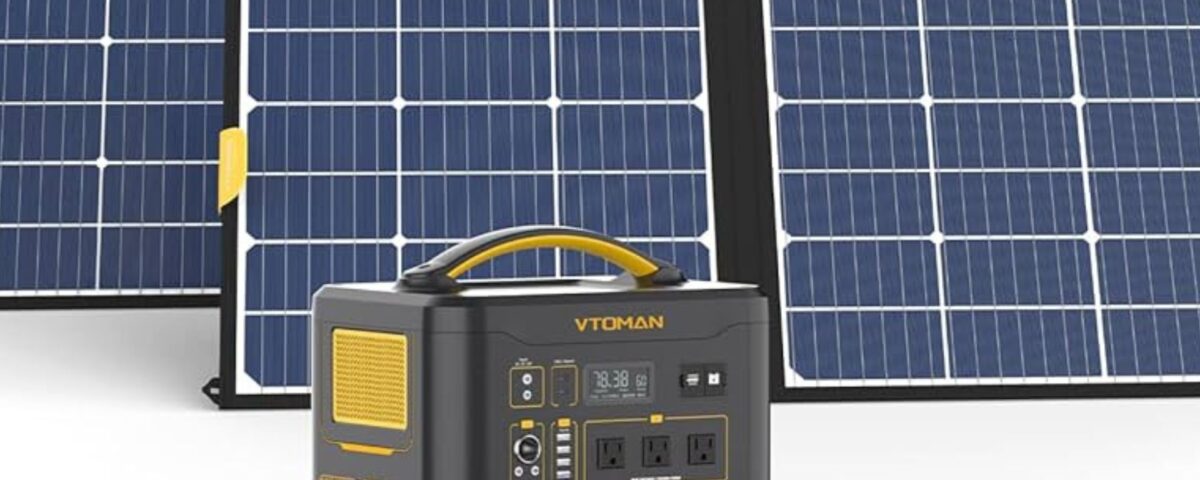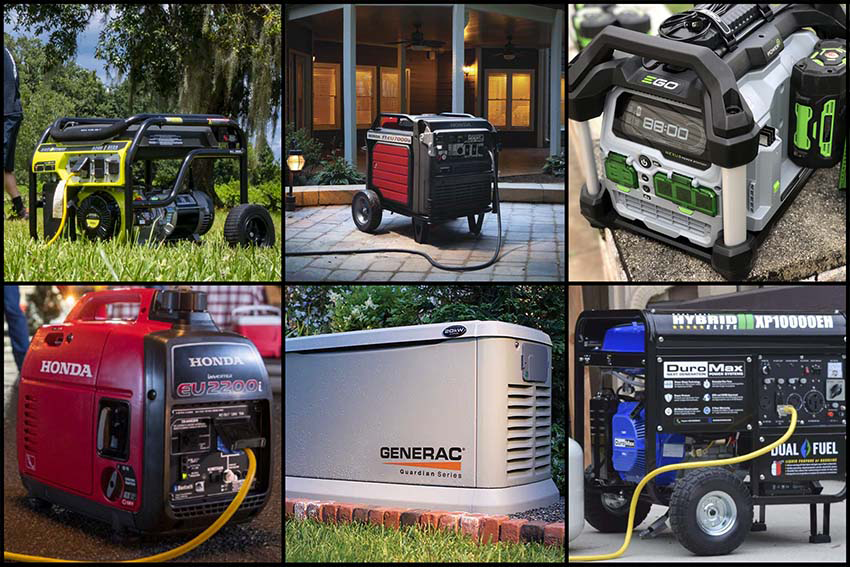
Solar generators have emerged as a pivotal technology in the ever-evolving world of renewable energy, reshaping how we think about and utilize power. Their growing importance cannot be overstated, especially when environmental concerns and the push for sustainable living are at an all-time high. Solar Generators harness the abundant and clean energy of the sun, converting it into electrical power that can be used in various settings – from remote camping trips to providing backup power for homes.
The relevance of solar power in today’s energy landscape is particularly significant. As the world grapples with the challenges of climate change and the depletion of fossil fuels, solar energy offers a clean, inexhaustible, and increasingly cost-effective solution. Solar generators are crucial in this transition, offering a portable, efficient, and eco-friendly alternative to traditional fossil fuel-based generators. Their ability to provide energy independence and reduce carbon footprints makes them essential to the global shift towards sustainable energy practices.
Moreover, advancements in solar technology have made solar generators more robust, reliable, and accessible than ever before. They are now viable for various applications, from emergency power during natural disasters to daily energy needs in off-grid living. This versatility, coupled with the ongoing improvements in solar panel efficiency and battery storage, positions solar generators as a critical player in the future of energy, promising a cleaner, more sustainable world for future generations.
Understanding Solar Generators
Definition of a Solar Generator
Solar Generator: is a device that turns energy from the sun into electricity.
Renewable Energy Source: Utilizes the sun, a sustainable and eco-friendly energy source.
How Solar Generators Work
Photovoltaic Process: Conversion of sunlight into electricity.
Direct Current (DC): Type of electrical flow solar panels generate.
Alternating Current (AC): Electricity type used in homes and businesses, facilitated by the generator.
Components of Solar Generators
Solar Panels: Capture sunlight and convert it into electrical energy.
Battery Storage: Stores the electrical energy for later use.
Inverter: Converts DC from solar panels to AC for regular electrical appliances.
Charge Controller: Regulates the flow of electricity to and from the battery, protecting it from overcharging and deep discharge.
Benefits of Solar Generators
Environmental Benefits
Renewable Energy: Solar generators harness energy from the sun, a sustainable and inexhaustible resource.
Clean Energy: They produce no pollutants or greenhouse gasses, contributing to a reduction in carbon footprint.
Cost-Effectiveness Over Time
Low Operational Costs: Solar generators require sunlight, which is unrestricted, leading to significant savings on fuel costs.
Long-Term Savings: Despite the initial investment, they offer a return over time through reduced electricity bills and minimal maintenance costs.
Portability and Versatility
Portable Design: Many solar generators are designed for easy transport, ideal for camping, outdoor activities, and emergencies.
Versatile Applications: They can be used in various settings, from powering homes during outages to providing energy in remote locations.
Quiet Operation and Low Maintenance
Silent Operation: Unlike traditional fuel generators, solar generators operate silently, making them suitable for quiet environments.
Minimal Maintenance: They have fewer moving parts, reducing the need for regular maintenance and the likelihood of mechanical failures.
Reliability and Safety Aspects
Dependable Power Source: Solar generators are reliable, especially in sunny conditions, providing a consistent power supply.
Safe to Use: They emit no harmful gases and pose lower risks of fire or other hazards associated with fuel-based generators.
Types of Solar Generators
Portable Solar Generators
Compact and Lightweight: Designed for ease of transport and setup, ideal for outdoor activities and travel.
Versatile Use: Suitable for camping, hiking, picnics, and other outdoor adventures where electricity is needed.
Solar Backup Generators for Home Use
Home Emergency Power: Provides electricity during power outages, ensuring continuous operation of essential appliances.
Integration with Home Systems: This can be integrated with home electrical systems for seamless transition during power cuts.
Commercial and Heavy-Duty Solar Generators
High Power Output: Suitable for large-scale events, building sites, and commercial venues, this device is designed for increased energy requirements.
Robust and Durable: Built to withstand rigorous use and harsh environmental conditions.
Specialized Solar Generators
For Camping and RVs: Tailored for the needs of campers and RV enthusiasts, offering a balance between portability and power capacity.
Customized Features: Additional features like weather-resistant materials, multiple outlets, and easy integration with camping gear or RV systems may be included.
Solar Generators vs. Traditional Generators
Solar Generators vs. Propane Generators
Propane Generators
Pros: Consistent power output, more efficient in cold weather, cleaner than gas/diesel, quieter operation.
Cons: Requires fuel storage, propane has a shelf life, and higher fuel costs than natural gas.
Best for: Backup power in residential areas, areas with moderate climate, and users who prioritize cleaner fuel than gas/diesel but need reliable power.
Not ideal for the environments where fuel storage is problematic, areas with high power demands.
Solar Generators vs. Hybrid Generators
Hybrid Generators (Combining Solar and Traditional Fuel)
Pros: Flexibility in energy source, more reliable power supply, eco-friendlier than purely fuel-based generators.
Cons: It can be expensive, requires complex setup and maintenance, and requires space for solar panels.
Best for: Users needing consistent power with the flexibility of fuel backup, environmentally conscious settings with varying power needs.
It is not ideal for Situations requiring simple, low-maintenance solutions or where space is limited.
Solar Generators vs. Wind Generators
Wind Generators
Pros: Good for areas with consistent wind, operates day and night, and is scalable from small to large setups.
Cons: Dependent on wind availability, noisy, requires significant space.
Best for: Windy regions, both off-grid and on-grid applications, more extensive scale power needs.
It could be better for urban or crowded settings or areas with low wind speeds.
Solar Generators vs. Battery Powered Generators
Battery Powered Generators
Pros: Quiet operation, no emissions, can be charged via grid or solar, very portable.
Cons: Limited energy capacity, requires pre-charging, and has a limited lifespan of batteries.
Best for: Short-term power needs, indoor use, and emergency backup for small appliances and devices.
Long-term power outages, applications with significant power demands, and circumstances where recharging would be more practical are only some of the best uses.
In an era where environmIncluding these comparisons in your article will help readers understand the diverse options available in the market and choose a generator that best suits their specific needs and environmental conditions.
Key Features to Consider When Choosing a Solar Generator
Power Output and Capacity
Importance of Wattage: Understand the wattage requirements of the devices you plan to power.
Capacity Considerations: Higher capacity means the ability to power more devices for a longer duration.
Battery Storage and Life
Battery Type and Quality: Consider durable batteries like lithium-ion, which offer longer life and better performance.
Battery Capacity: Measured in watt-hours (Wh), indicating how much energy it can store and supply.
Charging Options and Speed
Solar Charging: How well solar panels work and how long it takes to charge a battery in different sunlight situations.
Alternative Charging Methods: Charging via AC (wall outlet) or DC (car charger) can be crucial during prolonged cloudy or rainy days.
Size, Weight, and Portability
Physical Dimensions: Ensure the generator fits in your intended space and is suitable for your use (e.g., camping, RV, home backup).
Weight Considerations: Heavier generators might offer more power but can be less portable.
Additional Features
Outlets: Number and types of outlets (AC, DC, USB) to accommodate different devices.
Displays: Check for user-friendly displays showing important information like battery level, power output, and charging status.
Connectivity: Features like Bluetooth or Wi-Fi monitor and control the generator remotely.
Expandability: Option to connect additional batteries or solar panels for increased capacity.
These features are crucial in determining a solar generator’s overall performance, usability, and suitability for specific needs, whether for home backup, outdoor activities, or emergencies.
Selecting the Best Solar Generator
Assessing Your Power Needs
Calculate Total Wattage: List all devices you plan to power and sum their wattages to determine your total power requirement.
Consider Usage Duration: Estimate how long you must run each device between charges to understand battery capacity needs.
Factors to Consider
Budget: Determine your price range, considering that higher-priced models often offer more features or higher capacity.
Usage Scenario: Tailor your choice to the specific scenarios in which you’ll use the generator (e.g., camping, home backup, RV trips).
Brand Reliability: Research brands for their reputation in quality, customer service, and warranty offerings.
Top Picks and Reviews of the Best Solar Generators on the Market
Research Current Models: Look for recent reviews and comparisons of the latest solar generators.
Feature Comparison: Compare critical features like power output, battery capacity, portability, and additional functionalities.
User Experiences and Ratings
Customer Reviews: Check user reviews for real-world insights into performance, reliability, and potential issues.
Community Forums and Social Media: Explore discussions in relevant online communities for unfiltered opinions and usage tips.
Professional Ratings: Consider expert opinions and ratings from reputable technology or renewable energy sources.
By carefully considering these aspects, you can make an informed decision that balances your power needs with your budget and the contexts in which you will use the solar generator. This approach ensures that you select a generator that meets your immediate requirements and offers reliability and satisfaction in the long run.
Maintenance and Care of Solar Generators
Regular Maintenance Tips
Clean Solar Panels Regularly: Dust, dirt, and debris can reduce efficiency. Clean panels with a soft cloth and mild detergent if necessary.
Check Battery Connections: Ensure they are tight and clean. Look for signs of corrosion and clean if needed.
Monitor Battery Health: Keep an eye on charge levels and avoid letting the battery deplete entirely.
Inspect Cables and Connectors: Look for any signs of wear or damage and replace if needed.
Long-Term Storage and Care
Proper Storage Environment: Store in a cool, dry place to prevent damage from moisture or extreme temperatures.
Maintain Charge Levels: Store the battery at a 50-80% charge level and periodically recharge it if stored for an extended period.
Protect from Dust and Sun: Cover the generator to prevent dust accumulation and avoid prolonged exposure to sunlight when not in use.
Troubleshooting Common Issues
Reduced Power Output: Check if solar panels are obstructed or dirty. Inspect battery health and connections.
Generator Not Charging: Ensure solar panels are correctly oriented towards the sun. Check for damaged cables or connectors.
Inverter Problems: If the inverter is not working correctly, it could be a sign of an internal issue; consult the manufacturer or a professional.
Unusual Noises or Odors: These can be signs of a severe problem; stop using the generator and seek professional help.
Regular maintenance and proper care of your solar generator will extend its lifespan and ensure it operates efficiently and reliably whenever needed. Being proactive in addressing common issues will help you avoid more significant problems in the future.
Future of Solar Generators
Technological Advancements in Solar Generator Technology
Increased Efficiency: Studies are concentrating on more energy-efficient solar panels and batteries, enabling the production of more power in less space.
Next-Generation Batteries: Development of better battery technologies like solid-state or graphene-based batteries for longer life and faster charging.
Smart Technology Integration: Incorporating IoT and intelligent technologies for better energy management, remote monitoring, and predictive maintenance.
Potential Impact on the Renewable Energy Landscape
Grid Independence: Enhanced solar generators could increase off-grid living, reducing dependence on traditional power grids.
Emergency Power Solutions: More reliable and robust solar generators can support disaster-stricken areas or regions with unstable power supplies.
Reduced Carbon Footprint: As solar generators become more prevalent, they could significantly contribute to reducing global greenhouse gas emissions.
Emerging Trends in Solar Generator Designs and Features
Portable and Lightweight Models: Continued emphasis on portability for outdoor activities, emergencies, and remote applications.
Hybrid Systems: Combining solar with other renewable sources like wind or integrating with existing power systems for more efficient energy use.
Customizable and Scalable Systems: Systems are adaptable and extensible to accommodate various power requirements and situations.
Eco-Friendly Materials: Use of sustainable materials in manufacturing to minimize the environmental impact of the generators themselves.
The future of solar generators looks promising, with ongoing innovations poised to make them more efficient, versatile, and integral to meeting global energy needs sustainably. These advancements could revolutionize how we generate and use power, making solar generators a cornerstone of renewable energy solutions.
The exploration of solar generators throughout this article underscores their growing significance in renewable energy solutions. Solar generators stand out as a beacon of innovation and sustainability, offering a greener, cleaner, and more efficient way of harnessing the sun’s abundant energy. Their benefits — from environmental friendliness to cost savings and versatility — highlight their potential as an alternative and a preferred choice in various power generation scenarios.
ental conservation is paramount, solar generators present a compelling option for individuals and communities seeking to reduce their carbon footprint and embrace eco-friendly practices. The advancements in solar technology, along with the increasing accessibility and efficiency of these devices, reinforce their role as a critical player in the renewable energy landscape.
As we move forward, it is essential to recognize the value and impact of solar generators. They offer a practical, sustainable, and increasingly powerful solution for residential backup, outdoor recreational use, or larger-scale commercial applications. The ongoing innovations in this field promise even greater capabilities and broader adoption in the future.
In conclusion, solar generators are more than just an alternative energy source; they are a step towards a more sustainable and environmentally responsible future. We encourage individuals, businesses, and policymakers alike to consider solar generators a viable and valuable component of our collective energy strategy, paving the way toward a cleaner, greener, and more sustainable world.





